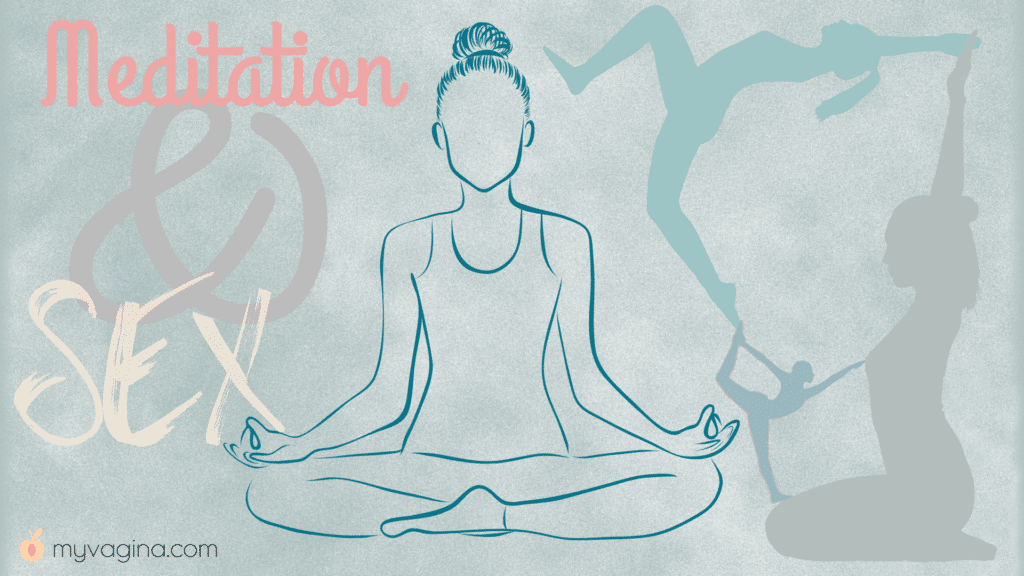Science has demonstrated over and over that mindfulness/meditation has a significant and indisputable positive effect on female sexual desire, as well as some other interesting measures.
What is mindfulness?
Mindfulness is a non-judgemental awareness of your own thoughts, perceptions and sensations in the moment. Mindfulness has a long history in certain cultures, but now everyone has heard of mindfulness or meditating, whether they practice it or not.
Mindfulness has a great deal of therapeutic benefits – proven by science – including reducing cortisol levels, and improving psychological function.
Putting mindfulness to the sexual test
Researchers have put mindfulness to the test with regards to sexual function, finding that both eight-session and four-session group mindfulness practices significantly improve sexual desire, sex-related distress, and other areas of psychological functioning in women with a history of sexual issues.
Group mindfulness has been repeatedly shown to significantly improve agreement between self-report and physiological sexual arousal, which means when you say you are aroused (or say you are not aroused) but your body indicates otherwise.
Women often have a disconnect between what their body is doing and what their mind is doing when it comes to sexual arousal, which is different in men, where it seems to be quite connected. Studies examined meditators and found that they have greater sexual motivation and sexual consciousness than non-meditators.
Mindfulness tasks have also been shown to improve symptoms of sexual dysfunction in women, but how this works is not as clear. A study was carried out on the relationship between how experienced a woman was at meditating and her sexual function.
An online survey was carried out regarding meditation experience, sexual function and desire, the ability to register internal changes, health and mood.
Women who meditated scored higher than those who did not on measures of sexual function and desire, but there didn’t seem to be any correlation between how experienced she was.
Global mental health was a predictor of increased sexual function and desire in women who meditate. The conclusion of the study was that women who meditate at all have, on average, improved sexual function and better overall mental health.
Findings have also been published that said women who practice meditation and incorporate mindfulness into their sexual activity report greater sexual satisfaction.
How much meditation gets good results?
Any mindfulness practice is helpful, since it has an immediate effect on your body and mind. There is no recommendation that will improve your sex life instantly – you have to find the balance yourself.
If you are new to meditation or mindfulness, you can download free meditations (Headspace is a good beginner’s app with 10 free sessions to help guide you into it) to start you off. Even if you just try five minutes a day, every day, you’ll be doing yourself good.
Remember, it’s not how long or how much, but doing it at all, that counts. There are usually group meditations that you can join in on, either for a small fee or for free, which can help you sit down for a set period of time a few times a week to chill your body and brain off.
References
- Ms Iulia Dascalu & Dr lori A Brotto (2017): Sexual functioning in experienced meditators, Journal of Sex & Marital Therapy, DOI: 10.1080/0092623X.2017.1405311
- Adam, F., Géonet, M., Day, J., & De Sutter, P. (2014). Mindfulness skills are associated with female orgasm? Sexual and Relationship Therapy, 1994(November), 256–267. http://doi.org/10.1080/14681994.2014.986085
- Brotto, L. A., & Basson, R. (2014). Group mindfulness-based therapy significantly improves sexual desire in women. Behaviour Research and Therapy, 57, 43-54. https://doi.org/10.1016/j.brat.2014.04.001
- Brotto, L. A., Chivers, M. L., Millman, R. D., & Albert, A. (2016). Mindfulness-Based Sex Therapy Improves Genital-Subjective Arousal Concordance in Women With Sexual Desire/Arousal Difficulties. Archives of Sexual Behavior. http://doi.org/10.1007/s10508-015-0689-8
- Brotto, L. A., & Goldmeier, D. (2015). Mindfulness Interventions for Treating Sexual Dysfunctions: The Gentle Science of Finding Focus in a Multitask World. Journal of Sexual Medicine, 12(8), 1687–1689. http://doi.org/10.1111/jsm.12941
- Khaddouma, A., Gordon, K. C., & Bolden, J. (2014). Zen and the art of sex: examining associations among mindfulness, sexual satisfaction, and relationship satisfaction in dating relationships. Sexual and Relationship Therapy, 30(2), 268–285. https://www.tandfonline.com/doi/abs/10.1080/14681994.2014.992408
- Lazaridou, A., & Kalogianni, C. (2013). Mindfulness and sexuality. Sexual and Relationship Therapy, 28(1), 29–38. https://www.tandfonline.com/doi/abs/10.1080/14681994.2013.773398
- Paterson, L. Q., Handy, A. B., & Brotto, L. A. (2016). A pilot study of eight-session mindfulness-based cognitive therapy adapted for women’s sexual interest/arousal disorder. The Journal of Sex Research, 1-12. https://www.tandfonline.com/doi/full/10.1080/00224499.2016.1208800
- Silverstein, R. G., Brown, A. C., Roth, H. D., & Britton, W. B. (2011). Effects of mindfulness training on body awareness to sexual stimuli: implications for female sexual dysfunction. Psychosom Med, 73(9), 817–825. http://doi.org/10.1097/PSY.0b013e318234e628







